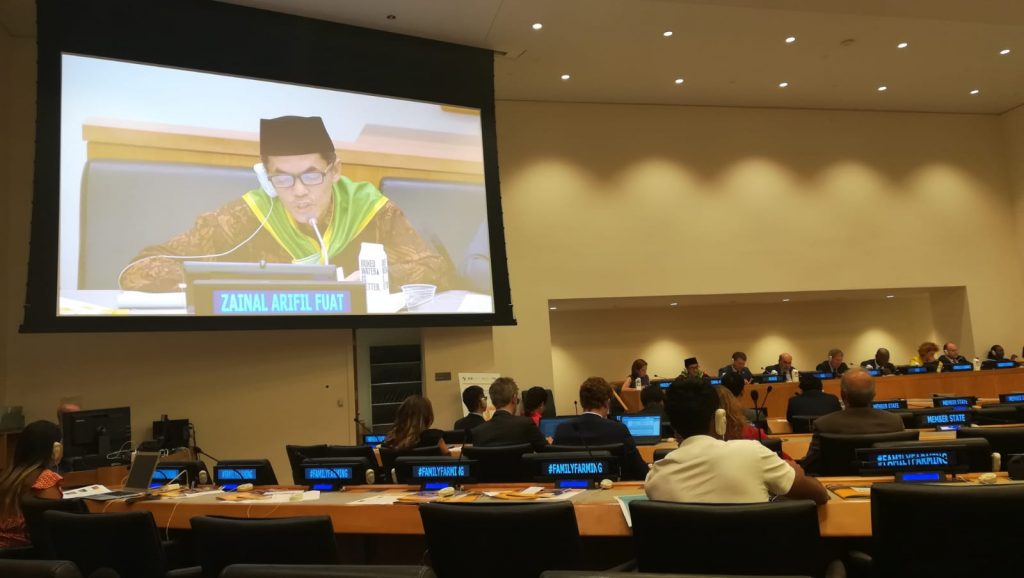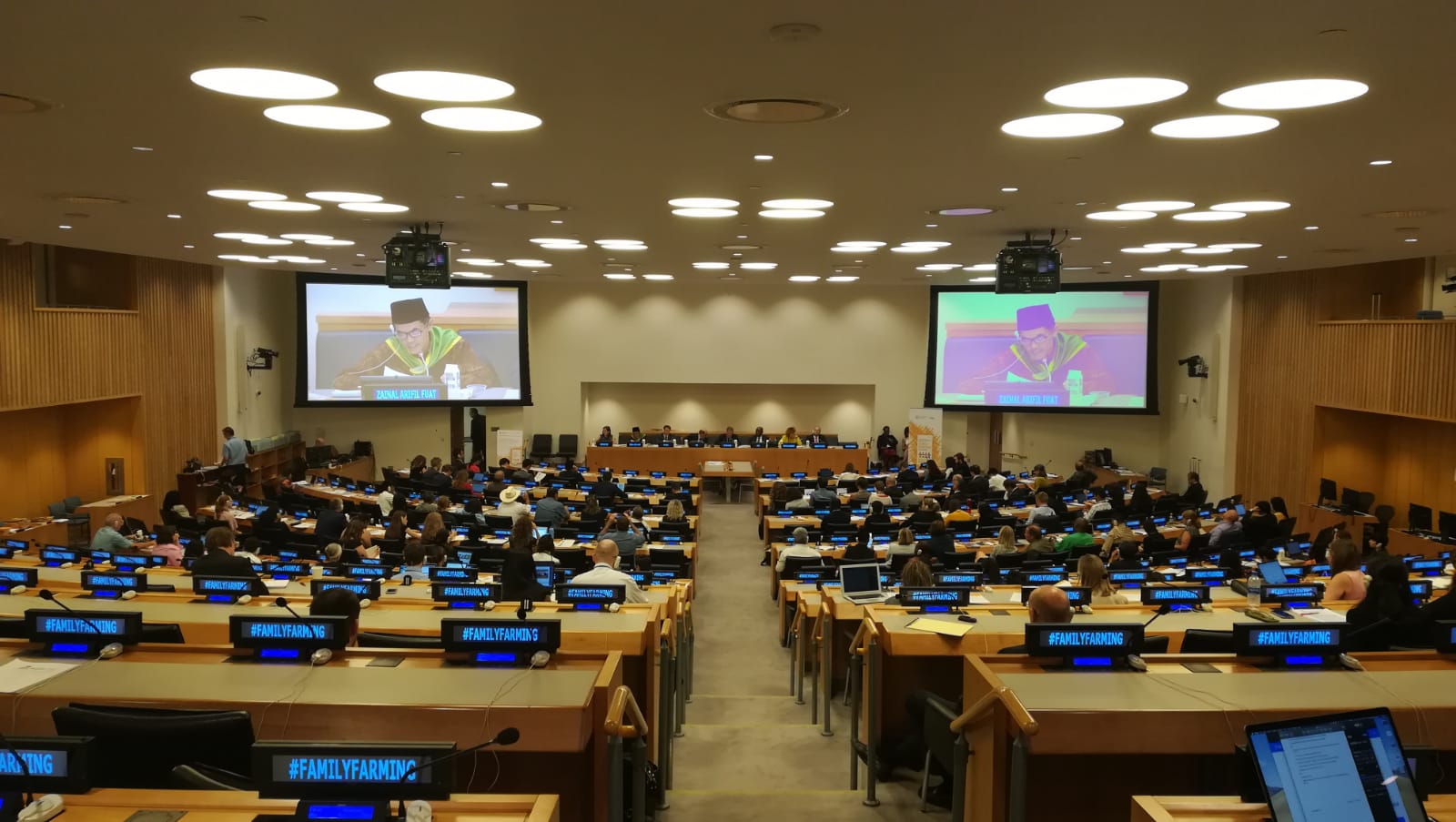This year marks the beginning of the United Nations Decade of Family Farming (2019-2028), proclaimed by the 72nd Session of the United Nations General Assembly. The resolution acknowledges the indispensable role that family farmers play in achieving the 2030 Agenda and the Sustainable Development Goals, contribution to sustainable food production and the eradication of poverty, food insecurity and malnutrition.
From 27-29 May 2019, the Global Launch of the United Nations Decade of Family Farming (2019-2028) took place at FAO Headquarters in Rome, Italy. Continuing on this momentum, a side event titled “Launch of the United Nations Decade of Family Farming (2019-2028): Synergies and main contributions to the 2030 Agenda for Sustainable Development” was held during the High Level Political Forum at the UN Headquarters, Newyork on the 16th of July.
La Via Campesina also made interventions during this side event that provided an opportunity to share with member states and delegations the views of our global peasant movement in this matter, especially after the adoption of the UN Declaration on Rights of Peasants and Other People Working in Rural Areas (UNDROP).
Zainal Arifin Fuat, the International Coodination Committee(ICC) member spoke during the session “Implementing the UN Decade of Family Farming: Voices from Family Farmers”. Here is the full text of his speech;
Excellencies, Ministers, Ambassadors and government representatives, Dear FAO, IFAD and UN agencies,
First of all, I would like to thank all those who have organized this event – Government of Costa Rica, Permanent Missions of France, FAO and IFAD – Thank you for the opportunity to be able to reflect upon the launch of the UN Decade of Family Farming on behalf of our peasant movement, and also to put some thoughts on the Decade in the next coming years in relation to the daily struggle of family farmers.

I stand here representing La Via Campesina, a movement with more than 200 million people across the world. It’s a movement of peasants, landless people, rural women and youth, indigenous people, migrants and agricultural workers.
Since its establishment, La Via Campesina has recognized family farming as a system that ensures healthy and sufficient food availability, upholds social and economic justice and ensures environmental sustainability. Therefore, La Via Campesina not only welcomes the presence of the UN Decade of Family Farming, but is committed to implement its principles for humanity and the Mother Earth, not for a decade but for all times.
In order to achieve the Sustainable Development Goal of zero hunger, and to provide healthy and nutritious food for everyone, family farming must be based on agroecology and food sovereignty, embracing small-scale food producers including fisher folks, pastoralists, forest people, waged workers and indigenous communities.
Based on the latest data of FAO, the number of undernourished people in the world has been on the rise since 2015, from 785,4 million people to 821,6 million people in 2018. This trend will not stop or maybe getting worst if we dont put the implementation in the first place.
In order to realize that, the implementation of the UN Decade of Family Farming must also be synchronized with the progressive realization of human rights, so that the processes are universal and inalienable; indivisible; interdependent and interrelated.
In this vein, we would like to emphasize the link between the UN Decade to the UN Declaration on the rights of peasants and other people working in rural areas (UNDROP) which has just been adopted in December last year by the UN General Assembly here in New York.
The recognition, fulfillment and protection of the rights of peasants contained in that UN Declaration will be the basis of the norms and indicators of success for the implementation of the UN Decade of Family Farming agenda.
In addition, the Farmers’ Rights in the Article 9 of the International Treaty on Plant Genetic Resources, the Right to Food, and other instruments like the Guidelines on Responsible Governance of Land, Fisheries and Forests, and CFS recommendations on Connecting smallholders to markets, empowerment of rural women, and the 10 elements of agroecology are prominent resources for our steps forward. These are the result of collective works and dialogue between grassroots organizations and UN agencies.
The right to land, right to water, right to seeds, rights of peasant women and other women working in rural areas – when recognized, upheld, and protected, are the solutions for the current challenges faced in the world’s food system. These rights, enshrined in the treaties, guidelines, and most importantly in the UN Declaration I mentioned above, can empower peasants and family farmers all around the world in order to reduce social conflicts, food crisis, poverty, migration, nature’s destruction and climate crisis, and also to attract and keep more and more young people in farming and in rural areas.
For the UN Decade to give more benefits to family farmers, we also need policy coherence at all levels including local, national, regional and sub-regional levels. We need to bring home these global policy outcomes including the pillars of the Global Action Plan.
I, therefore, would like to invite all the country representatives, FAO and IFAD offices, with peasant and small-scale family farmer organizations to work hand-in-hand not only at global level, but also at national and regional levels. Because we all know: without us, there will be no successful UN Decade of Family Farming, no SDGs to achieve. It is critical that during the Decade our voice is heard and amplified to lead to real improvement on the livelihoods of family farmers.
Excellencies, Ministers, Ambassadors and government representatives, FAO, IFAD, and UN agencies, I hope you can take responsibility and step up efforts to achieve the success of Decade together with us, and also for the future of our common planet, our Mother Earth. This is only possible if the Decade is led by peasants, indigenous peoples, fisher folks, pastoralists, and forest people’s needs and not by institutional priorities. This is only possible with deep structural transformations, including the transition towards agroecology and genuine agrarian reform; recognizing, defending, and protecting land, water, seeds, under the human rights of peasants, fisherfolks and other people working in rural areas.
Long live family farmers! Hidup Petani!
I thank you.
Speaking from the floor, Ayla Fenton of the National Farmers’ Union and La Via Campesina Canada also issued a stern warning;
“We cannot disconnect the increased food insecurity shown in the launch of the SOFI report yesterday, from the dismantling of peasant food systems. The SOFI report and the speakers in yesterday’s event are calling for a radical change in the food system, yet the solutions proposed still follow the same line which consolidate corporate interests over human rights- if we continue like this, we can expect increase in food insecurity next year. There is a clear need to support small-scale production with strong public polices which enable access to markets, social security, and control over their natural resources, including land and seeds. Yet, according to FAO, small-scale food producers are feeding 70% of the world with only 30% of the resources- and as was stated 80% of food insecure persons are living in rural areas. “
She also added, “We welcome the placement of rural women as a central pillar of the Decade, and the recognition that women are particularly marginalized, however this recognition does not seem to translate into action points on establishing a broader reality of human rights for women in rural communities. We hope that the CEDAW General Recommendation on the Rights of Rural Women will be taken up seriously within the decade.”

